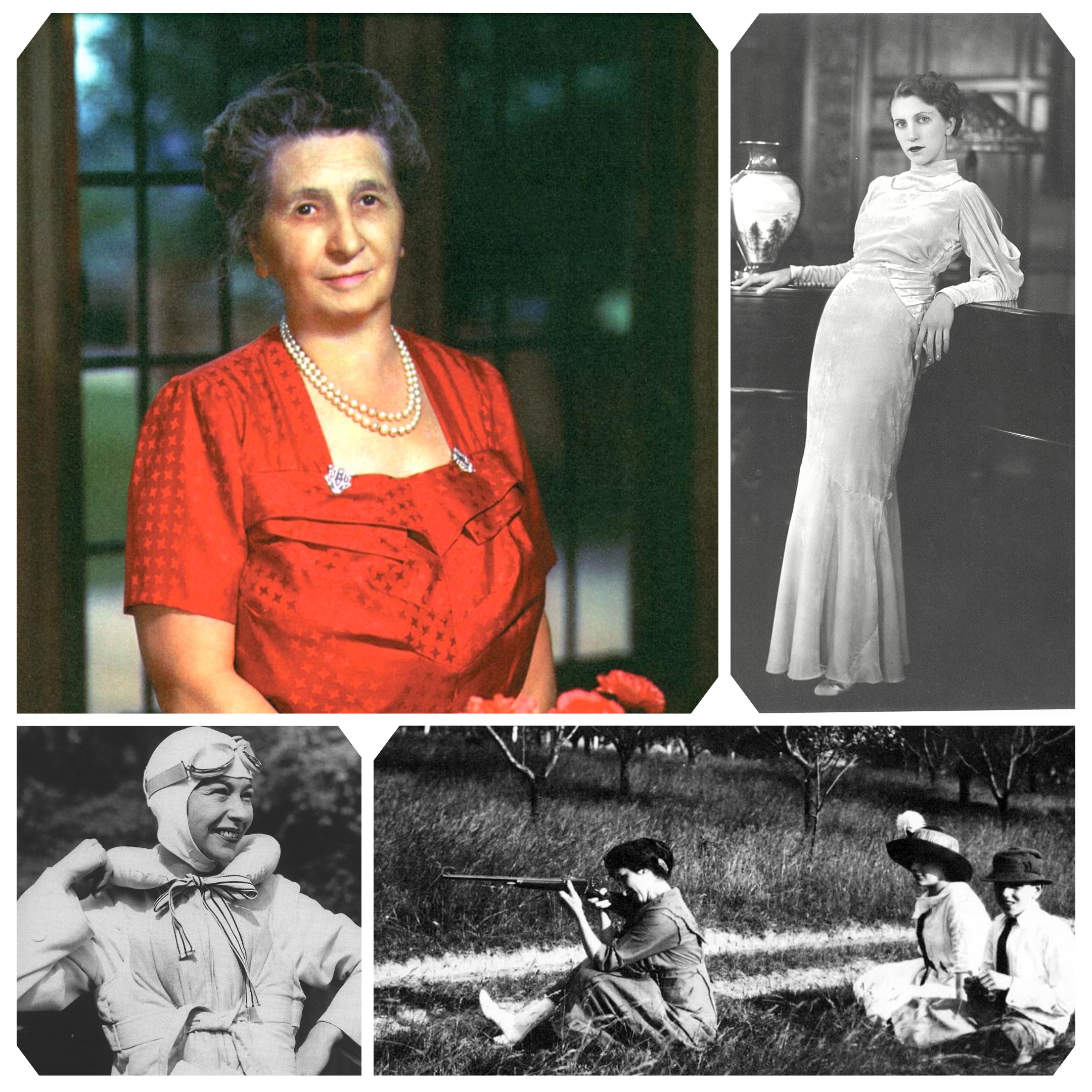Women’s History Month provides the perfect opportunity to delve into the remarkable lives and accomplishments of the women of Meadow Brook Hall. Indeed, the Dodge and Wilson family trees provide strong and varied branches on each side, carrying unique personalities, vision and an inimitable style across generations.
At Meadow Brook, there are many women to discover – from Matilda Dodge Wilson, the dynamic matriarch, philanthropist, social activist and key player in the automotive aristocracy, to the glamor girl and equestrian Frances Dodge, the daring trend-setter Delphine Dodge and beyond. Read the stories below to learn more about these incredible women!
Matilda Dodge Wilson
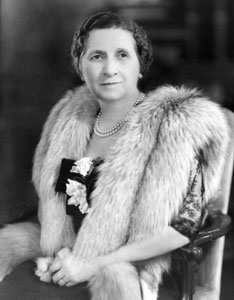 The daughter of a saloon-keeper, Matilda (Rausch) Dodge Wilson was a self-made, modern woman of the 20th century who lived an all-American success story. She built a legacy as a businesswoman, preservationist, art collector, horsewoman, farmer and philanthropist. Her work in more than 40 community and in leading national service, political and philanthropic organizations wrought positive change in a wide variety of ways, yet her impact as the founder (alongside her second husband Alfred Wilson) of Oakland University may be her most enduring achievement.
The daughter of a saloon-keeper, Matilda (Rausch) Dodge Wilson was a self-made, modern woman of the 20th century who lived an all-American success story. She built a legacy as a businesswoman, preservationist, art collector, horsewoman, farmer and philanthropist. Her work in more than 40 community and in leading national service, political and philanthropic organizations wrought positive change in a wide variety of ways, yet her impact as the founder (alongside her second husband Alfred Wilson) of Oakland University may be her most enduring achievement.
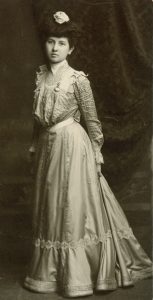 As the wife of automotive pioneer John Dodge, she became extremely wealthy, yet Matilda also experienced great tragedy in her life. When John Dodge died of Influenza in 1920, he left her a widow with three young children (her youngest Anna Margaret died shortly after from measles) and an immense fortune – which ranked her as one of the wealthiest women in the world.
As the wife of automotive pioneer John Dodge, she became extremely wealthy, yet Matilda also experienced great tragedy in her life. When John Dodge died of Influenza in 1920, he left her a widow with three young children (her youngest Anna Margaret died shortly after from measles) and an immense fortune – which ranked her as one of the wealthiest women in the world.
She married lumber broker Alfred Wilson in 1925 and together they built Meadow Brook Hall. Matilda cared deeply for her family and cherished her role of mother, step-mother and adoptive mother to the Dodge and Wilson children.
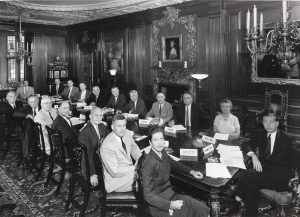
Matilda understood the power of her privileged position and used it to make progressive strides for women and to improve the community and world around her. In 1931, Time magazine named her the “most prominent woman in U.S. Banking” when she was given the position of Chairman of the Board at the Fidelity Bank & Trust Co.
She was the first woman to serve as lieutenant governor of the state of Michigan in 1940 (it was 40 more years before another woman held the office). Matilda devoted years of her life as a key contributor to the Salvation Army, the Presbyterian Church, the Boys and Girls Club, and of course Oakland University.
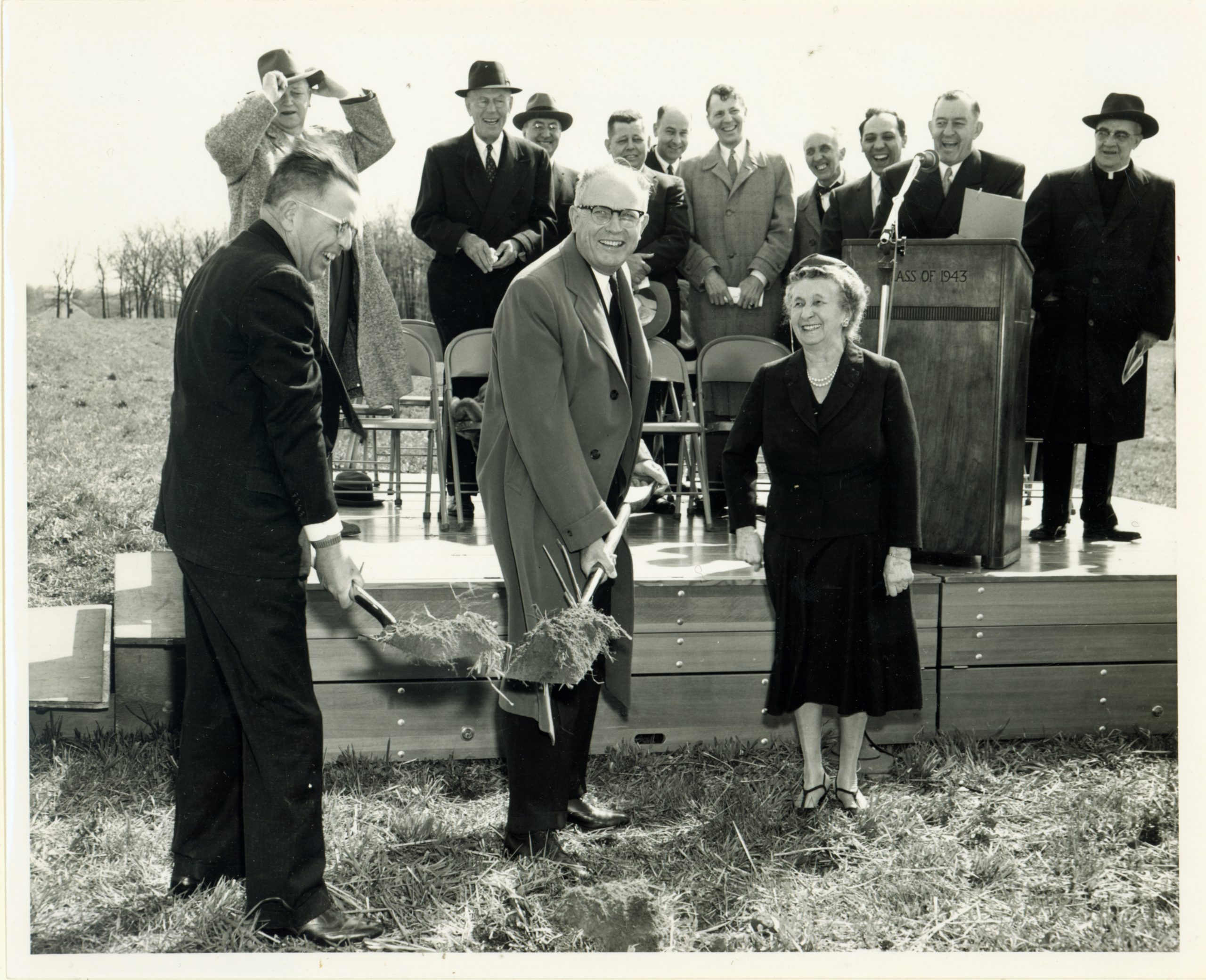
By all accounts, Matilda was a remarkably talented and considerate individual. She treated her staff with kindness and was not afraid to literally get her hands dirty by scrubbing tile floors.
She knit for soldiers during World War II and personally chose and wrapped presents each Christmas for the children in the Denby Children’s Home. Matilda summarized the work of her lifetime best when she said “I want to serve the community in gratitude.”
Frances Dodge
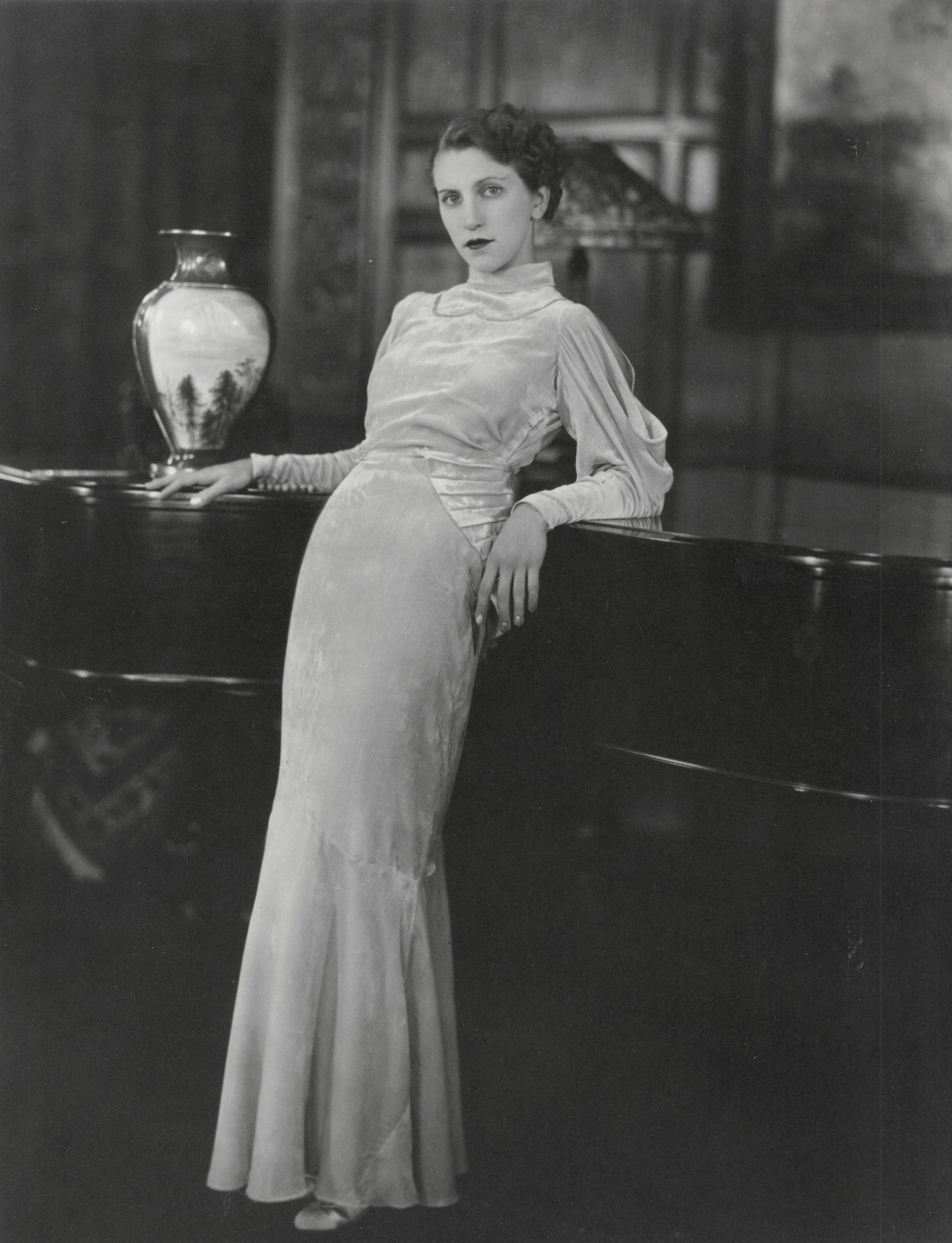 Known as “Detroit’s #1 Glamor Girl” for her sparkling personality, penchant for adventures, and impeccable style, Frances Dodge was also an internationally renowned horsewoman.
Known as “Detroit’s #1 Glamor Girl” for her sparkling personality, penchant for adventures, and impeccable style, Frances Dodge was also an internationally renowned horsewoman.
On her 25th birthday, Frances received her $10,000,000 inheritance from the John Dodge estate. Her surprise birthday party that year is the stuff of American aristocratic legend. Frances planned on an intimate dinner celebration with her family in the Christopher Wren Dining Room at Meadow Brook Hall. When they got up from the table, Frances was greeted by hundreds of her friends in the family ballroom—to the tune of the Tommy Dorsey orchestra sung by Frank Sinatra.
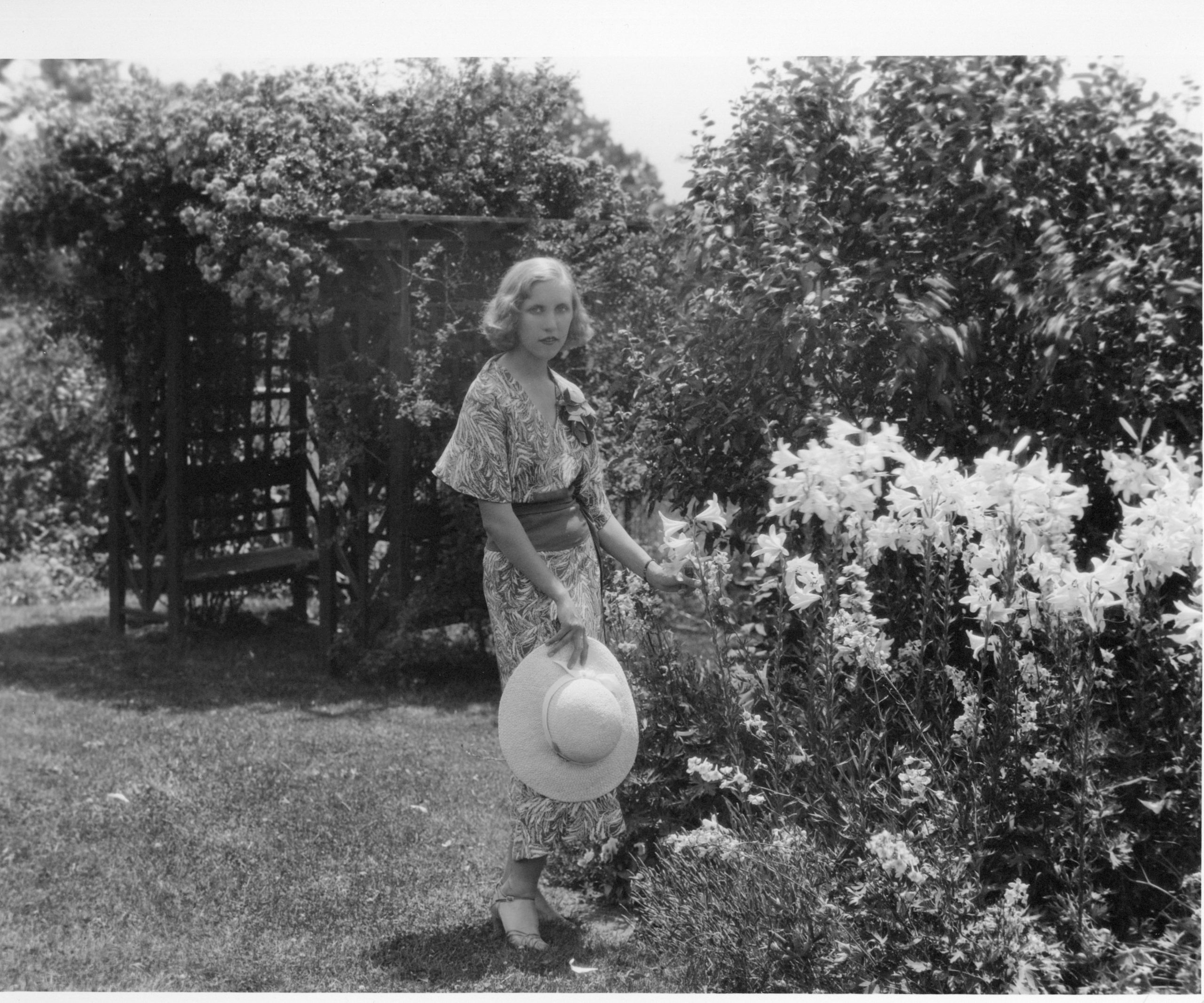 In 1934, Frances embarked on a “World Tour.” She took her mother Matilda and stepfather Alfred on a six-month tour of the Southern Hemisphere, including North Africa, South Africa, Rhodesia, Egypt, India, Palestine, and Spain.
In 1934, Frances embarked on a “World Tour.” She took her mother Matilda and stepfather Alfred on a six-month tour of the Southern Hemisphere, including North Africa, South Africa, Rhodesia, Egypt, India, Palestine, and Spain.
Frances’ lifelong passion for horses and racing was linked to her prowess as a businesswoman as well. Frances owned 80 horses by the time she was 22 years old. She opened the world-renowned Dodge Stables when she was also in her twenties, and owned the Detroit Race Track (Wolverine Raceway) for trotters, and the Pompano Race Track in Florida (her brother Richard was the track manager). She bought Castleton Farms in Lexington, Kentucky, where she 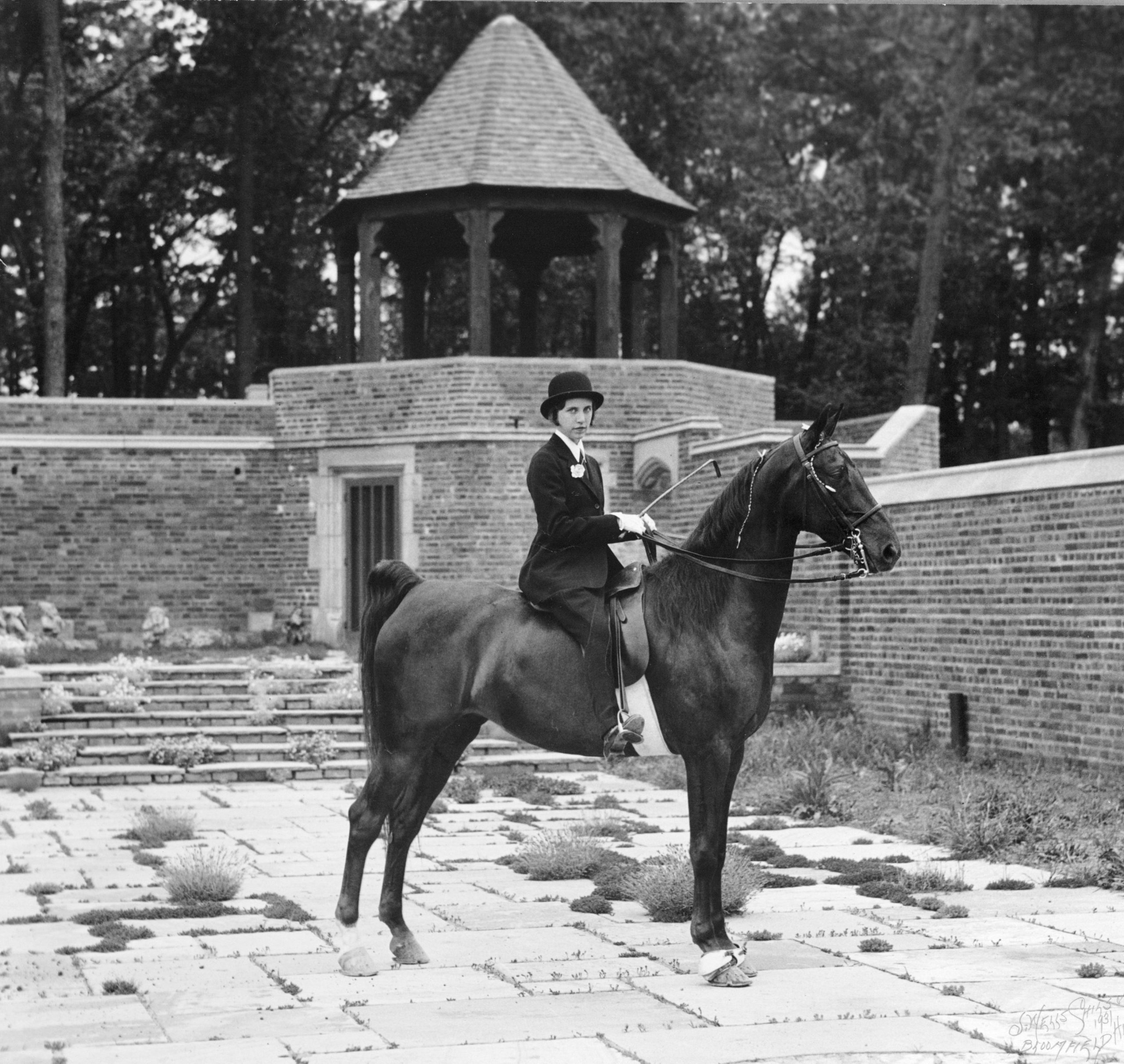 became adept at horse racing and breeding. Castleton was to become a standardbred breeding farm as successful as any worldwide.
became adept at horse racing and breeding. Castleton was to become a standardbred breeding farm as successful as any worldwide.
Frances set the record for trotting under saddle – a record that stood for 54 years until it was broken by a horse bred by one of her daughters. She won many national awards in her career and was considered one of the women pioneers in the sport. In 1972, she was posthumously elected to the World Championship Horse Show Hall of Fame, along with her horse Wing Commander, and trainer Earl Teater.
Delphine Dodge
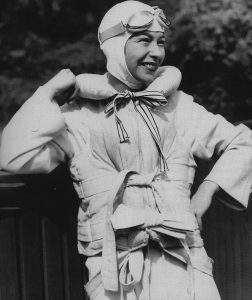 Daughter to Horace Dodge and cousin to the Dodge and Wilson children, Delphine Dodge also inherited her family’s ambitious spirit. Along with her brother Horace Jr., Delphine’s driving passion was competitive boat racing. While Horace Jr. explored motor boat mechanics and piloting, Delphine reaching celebrity status as a daring racer.
Daughter to Horace Dodge and cousin to the Dodge and Wilson children, Delphine Dodge also inherited her family’s ambitious spirit. Along with her brother Horace Jr., Delphine’s driving passion was competitive boat racing. While Horace Jr. explored motor boat mechanics and piloting, Delphine reaching celebrity status as a daring racer.
As one of the first women in the sport, Delphine made plenty of waves and achieved an historic victory in the President’s Cup Regatta, an annual race on the Potomac River. Delphine was awarded the President’s Cup trophy from President Calvin Coolidge on the lawn of the White House in 1927.
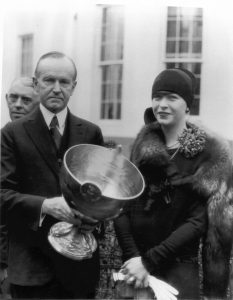
Both siblings found success, joy and fulfillment on the water without hindering their friendship, even across years of intense competition. And to this day, the names Horace and Delphine Dodge are still synonymous with boat racing, particularly for those still speeding on the Detroit River.
Delphine explained her skills and reconciled her feminine interest in racing by saying: “I have tried many sports but for crowding thrills of a lifetime into one minute, for the meeting of unexpected hazards with quick and accurate thinking, I know of no sport equal to motorboat racing…. A woman does not for a minute have to give up her femininity to be a motorboat driver. A psychologist might discover that the quickness of a woman’s mind makes her even more suitable for the handling of a roaring, flashing motorboat dashing through the water at 60 or 70 mph than a man.”
For more stories of Meadow Brook, visit meadowbrookhall.org/history-at-the-hall.

